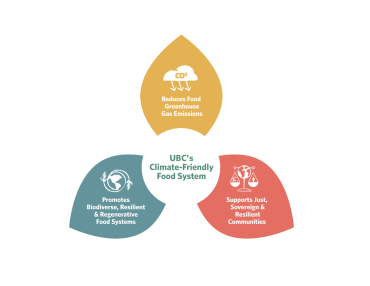These Climate-Friendly Food System Procurement Guidelines represent one of many bold actions the university has committed to help achieve UBC's Climate Action Plan (CAP) 2030 commitments. CAP sets a target by 2030 to achieve a 50% reduction of food systems Greenhouse Gas (GHG) emissions.
UBC’s Food emissions represent approximately 21% of overall campus GHG emissions and 31% of extended impact emissions, and may become the largest category as the other UBC emissions sources reduce. UBC is uniquely positioned to make significant positive impacts in Climate Action by virtue of its immense population as the second largest Canadian university by student enrollment, as the largest Canadian student housing provider, and by its sheer food purchasing power.
The Climate-Friendly Food System Procurement Guidelines serve as a critical roadmap that provide direction on how the university can:
- Reduce food GHG emissions
- Promote biodiverse, resilient and regenerative food systems
- Support just, sovereign and resilient communities.

Goal: Reduce Food Greenhouse Gas Emissions
Click the drop down below for detailed guidelines related to this goal.
Goal: Promote Biodiverse, Resilient & Regenerative Food Systems
Click the drop down below for detailed guidelines related to this goal.
Goal: Support Just, Sovereign and Resilient Communities
Click the drop down below for detailed guidelines related to this goal.